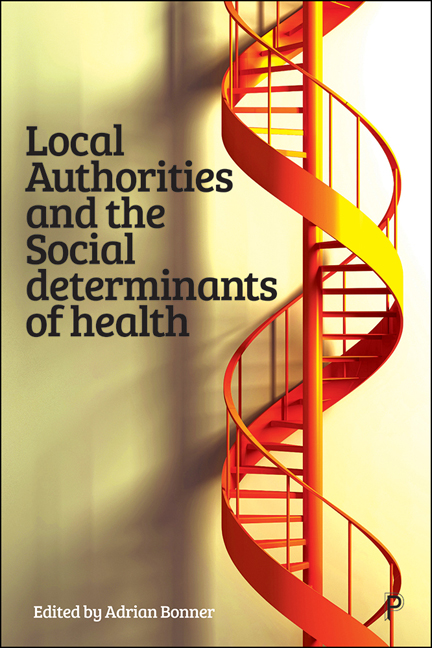Book contents
- Frontmatter
- Dedication
- Contents
- List of Figures, Tables and Boxes
- Notes on Contributors
- Acknowledgements
- Foreword
- Summary
- Introduction: Key Sociopolitical Changes Affecting the Health and Wellbeing of People
- Part I Health, Social Care and Community Wellbeing
- Part II The Role of Local Authorities in Promoting Health and Wellbeing in the Community
- Part III Local Authority Commissioning
- Part IV The Third Sector
- Part V Socio-Economic Political Perspectives
- Conclusion
- Appendix: COVID-19 Timeline
- Index
14 - Commissioning and Social Determinants: Evidence and Opportunities
Published online by Cambridge University Press: 25 March 2021
- Frontmatter
- Dedication
- Contents
- List of Figures, Tables and Boxes
- Notes on Contributors
- Acknowledgements
- Foreword
- Summary
- Introduction: Key Sociopolitical Changes Affecting the Health and Wellbeing of People
- Part I Health, Social Care and Community Wellbeing
- Part II The Role of Local Authorities in Promoting Health and Wellbeing in the Community
- Part III Local Authority Commissioning
- Part IV The Third Sector
- Part V Socio-Economic Political Perspectives
- Conclusion
- Appendix: COVID-19 Timeline
- Index
Summary
Introduction
Local authorities spend thousands of pounds commissioning services: from professional services, highways maintenance, school meals, housing and social care, as noted in Part II of this book. Local authorities in the United Kingdom (UK) account for a quarter of all public spending (MHCLG, 2018). While much of this expenditure is accounted for by directly employed staff costs, a substantial proportion (around £70 billion in 2016/17 (Booth, 2018)) is used on commissioned services – services delivered by the relevant council, by other parts of the public sector or by external organisations. Local authorities have responsibilities for reducing health inequalities and tackling the social determinants of health, which they can impact at a population level through their key role in early years education, schools, planning, housing, social care, public space, air quality, public transport and community development. Since 2013, they have also had responsibilities for public health (see Chapter 2), following the transfer of responsibilities from the National Health Service (NHS) and creation of health and wellbeing boards (HWBs) under the provisions of the Health and Social Care Act 2012 (see Chapter 4). It has long been recognised that local government plays an important role in shaping social determinants of health (Marks et al, 2015); indeed, the pivotal role of local government has been recognised by the World Health Organization Commission on the Social Determinants of Health (WHO Commission on Social Determinants of Health, 2008). As such, decisions by local authorities about what, how, when and from whom services are commissioned play strategic and significant roles in their local areas.
In this chapter, it is argued that local authorities can and should use their purchasing power strategically to address the social determinants of health that affect their local area. The chapter is structured as follows. First, the authors examine commissioning and procurement as local authority functions, defining these concepts and exploring the conceptual confusion between the two. Secondly, the evidence of current practice of local authorities (with a particular focus on local authorities in the UK) in strategic use of their purchasing power is explored. Core to the argument is the role of local voluntary organisations and small and medium-sized enterprises (SMEs), so there is a particular focus on the commissioning experience of these types of organisations.
- Type
- Chapter
- Information
- Local Authorities and the Social Determinants of Health , pp. 269 - 282Publisher: Bristol University PressPrint publication year: 2020

